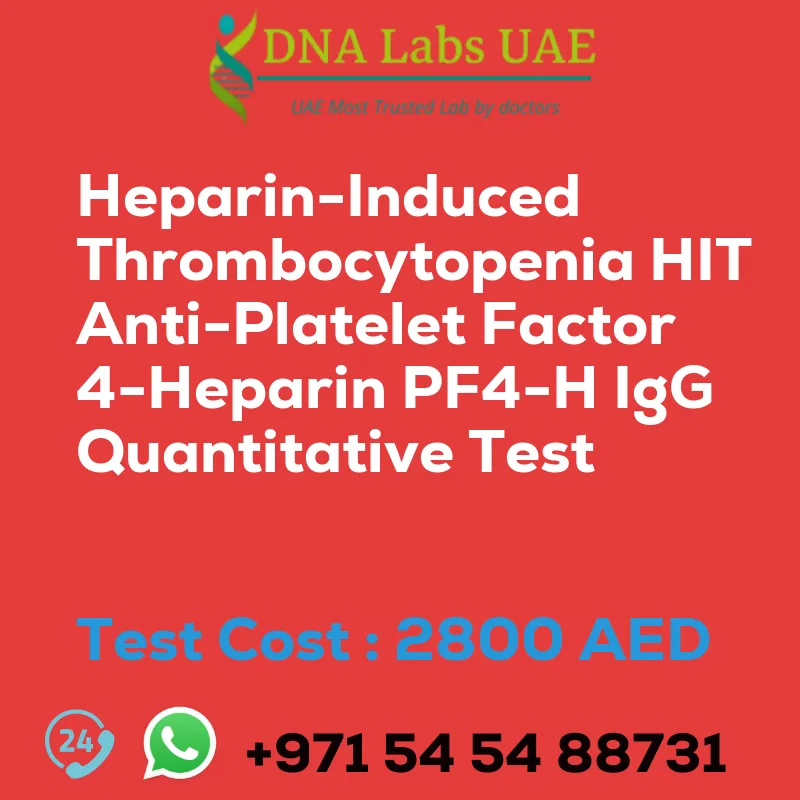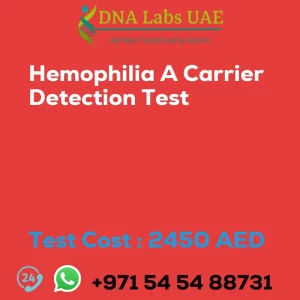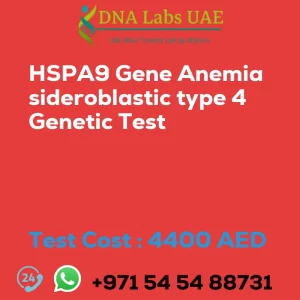HEPARIN INDUCED THROMBOCYTOPENIA (HIT) – Anti Platelet Factor 4-Heparin (PF4-H) IgG Quantitative Test
Test Cost: AED 2800.0
Test Components:
- Price: AED 2800.0
Sample Condition:
3 mL whole blood in 1 Blue Top (Sodium Citrate) tube. Mix thoroughly by inversion. Transport to Lab within 4 hours. If this is not possible, make PPP within 1 hour of collection as follows: Centrifuge sample at 3600 rpm for 15 min. & transfer supernatant to a clean plastic tube. Centrifuge this supernatant again at 3600 rpm for 15 mins. & finally transfer the supernatant (PPP) to 1 labelled, clean plastic screw capped vial. FREEZE IMMEDIATELY. Ship frozen. DO NOT THAW. Overnight fasting is preferred. Duly filled Coagulation Requisition Form (Form 15) is mandatory.
Report Delivery:
Sample Daily by 11 am; Report Same day
Method:
Chemiluminescent Immunoassay (CLIA)
Test Type:
Disorders of Coagulation
Doctor:
Cardiologist, Hematologist
Test Department:
COAGULATION
Pre Test Information:
Overnight fasting is preferred. Duly filled Coagulation Requisition Form (Form 15) is mandatory.
Test Details:
Heparin-induced thrombocytopenia (HIT) is a condition characterized by a decrease in platelet count caused by the immune system’s response to heparin, a commonly used blood thinner. It is important to diagnose HIT promptly as it can lead to serious complications such as blood clots.
The anti-platelet factor 4-heparin (PF4-H) IgG quantitative test is a laboratory test used to diagnose HIT. It measures the levels of anti-PF4-H antibodies in the blood, specifically IgG antibodies. These antibodies are produced by the immune system in response to the formation of complexes between heparin and platelet factor 4 (PF4), a protein found in platelets.
The test involves taking a blood sample from the patient and measuring the levels of anti-PF4-H IgG antibodies using a quantitative method, such as enzyme-linked immunosorbent assay (ELISA). The results are reported as a numerical value, indicating the concentration of antibodies in the blood.
A positive result, indicating high levels of anti-PF4-H IgG antibodies, suggests the presence of HIT. However, it is important to note that a positive result alone is not sufficient for diagnosis. Clinical assessment, including the patient’s symptoms and other laboratory tests, is also necessary to confirm the diagnosis.
The anti-PF4-H IgG quantitative test is a valuable tool in diagnosing HIT and guiding appropriate treatment decisions. It helps differentiate HIT from other causes of thrombocytopenia and allows for timely management to prevent complications associated with this condition.
| Test Name | HEPARIN INDUCED THROMBOCYTOPENIA HIT ANTI PLATELET FACTOR 4-HEPARIN PF4-H IgG QUANTITATIVE Test |
|---|---|
| Components | |
| Price | 2800.0 AED |
| Sample Condition | 3 mL whole blood in 1 Blue Top (Sodium Citrate) tube. Mix thoroughly by inversion. Transport to Lab within 4 hours. If this is not possible, make PPP within 1 hour of collection as follows: Centrifuge sample at 3600 rpm for 15 min. & transfer supernatant to a clean plastic tube. Centrifuge this supernatant again at 3600 rpm for 15 mins. & finally transfer the supernatant (PPP) to 1 labelled, clean plastic screw capped vial. FREEZE IMMEDIATELY. Ship frozen. DO NOT THAW. Overnight fasting is preferred. Duly filled Coagulation Requisition Form (Form 15) is mandatory. |
| Report Delivery | Sample Daily by 11 am; Report Same day |
| Method | Chemiluminescent Imuunoassay (CLIA) |
| Test type | Disorders of Coagulation |
| Doctor | Cardiologist, Hematologist |
| Test Department: | COAGULATION |
| Pre Test Information | Overnight fasting is preferred. Duly filled Coagulation Requisition Form (Form 15) is mandatory. |
| Test Details |
Heparin-induced thrombocytopenia (HIT) is a condition characterized by a decrease in platelet count caused by the immune system’s response to heparin, a commonly used blood thinner. It is important to diagnose HIT promptly as it can lead to serious complications such as blood clots. The anti-platelet factor 4-heparin (PF4-H) IgG quantitative test is a laboratory test used to diagnose HIT. It measures the levels of anti-PF4-H antibodies in the blood, specifically IgG antibodies. These antibodies are produced by the immune system in response to the formation of complexes between heparin and platelet factor 4 (PF4), a protein found in platelets. The test involves taking a blood sample from the patient and measuring the levels of anti-PF4-H IgG antibodies using a quantitative method, such as enzyme-linked immunosorbent assay (ELISA). The results are reported as a numerical value, indicating the concentration of antibodies in the blood. A positive result, indicating high levels of anti-PF4-H IgG antibodies, suggests the presence of HIT. However, it is important to note that a positive result alone is not sufficient for diagnosis. Clinical assessment, including the patient’s symptoms and other laboratory tests, is also necessary to confirm the diagnosis. The anti-PF4-H IgG quantitative test is a valuable tool in diagnosing HIT and guiding appropriate treatment decisions. It helps differentiate HIT from other causes of thrombocytopenia and allows for timely management to prevent complications associated with this condition. |








